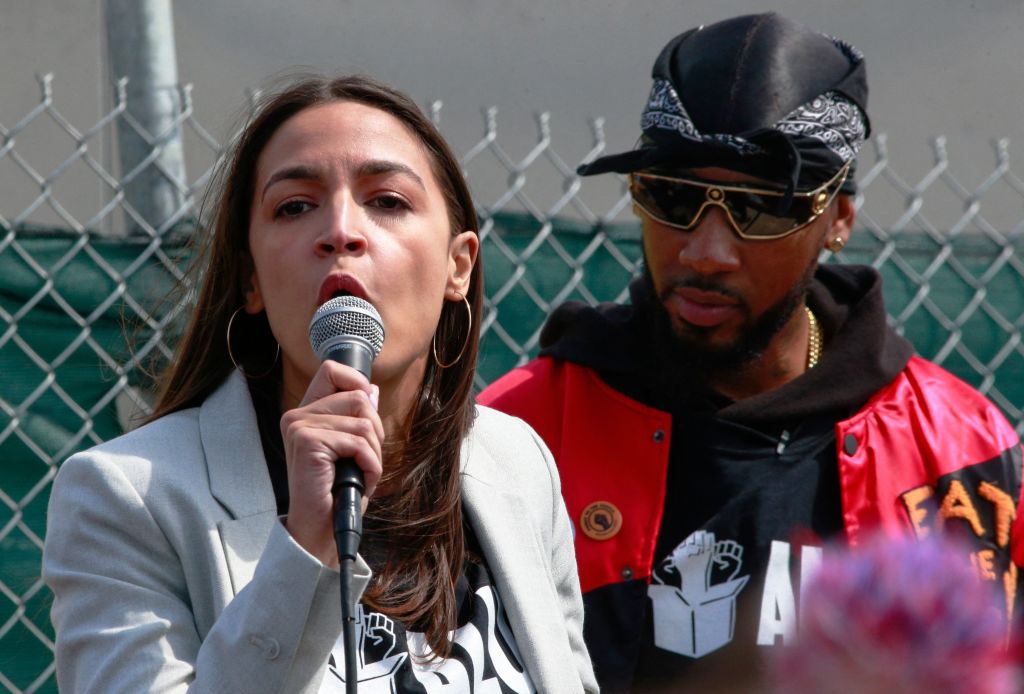
With Democrats on the brink of losing unilateral control of the federal government, progressives are pushing their party’s leaders to boost funding for the agency that helps guard workers’ rights to organize.
“We need to get this done this Congress, between now and December 31st, because I’m not going to sit here and pretend that a Republican-controlled Congress is going to put this at the top of the docket,” Rep. Alexandria Ocasio Cortez of New York said at a news conference on Tuesday in front of the Capitol.
The effort to secure a relatively modest budget increase for the National Labor Relations Board (NLRB) comes at a fraught moment for the labor movement. Earlier this month, President Biden, who promised to be the most pro-union President in American history, signed a bill blocking a strike of rail workers who were threatening to walk off the job over having no paid sick leave. For some labor leaders, boosting the agency’s funding would be a sign Democrats aren’t taking the movement’s support for granted.
“The fact that we have to have a press conference and draw attention to this issue shows what’s fundamentally wrong,” says Joseph Geevarghese, the executive director of Our Revolution, whose members held pro-union signs as lawmakers spoke outside the Capitol. “The Democratic Party is not in touch with its roots.”
It’s illegal to retaliate against workers for starting or joining a union. The NLRB is responsible for holding employers who violate labor law accountable and help parties in labor disputes reach settlements. But resolving complaints has often been slow, a situation that labor activists say deters efforts to organize workers.
Read more: The Standoff Between Workers and Their Bosses Is Set To Heat Up in 2023
“If that takes months, and sometimes years, to be resolved, the chilling effect is not just the employer at that point,” says Jimmy Williams, co-chair of the Worker Power Coalition. “It’s the government as well that’s holding them back.”
Williams and other labor advocates argue that the cause of the delays is the NLRB’s lack of funding, which has been capped at just below $275 million since 2014. Thanks to inflation, that money has had to stretch farther and farther. Between 2006 and 2019, the number of full-time staff at the agency dropped by almost 31%. The NLRB warned last month that absent an increase in funding, it would be forced to furlough employees.
As congressional leaders haggle over spending bills that could surpass $1.5 trillion, labor activists are asking for a drop in the bucket. The agency has requested nearly $320 million in funding. Progressive lawmakers and union organizers are pushing for $368 million.
“If we can invest almost a trillion dollars in our military, we can take care of our workers,” said Rep. Jamaal Bowman, Democrat of New York. “We are not upholding the ideals of our Constitution if we do not take care of our workers. We’re faking the funk, we are frauds.”
“What the hell are we doing here if we are not taking care of working-class people?” Bowman asked.
Biden’s decision to block a rail strike earlier this month came after Democrats in Congress failed to find the votes to address the issue at the center of the labor dispute: a lack of paid sick days. While many labor leaders blamed Republicans for putting Biden and the Democrats in a difficult position, others were frustrated that Democrats undermined rail workers over fear of how a strike would affect the economy.
“If we say that we’re going to stand with workers, we have to stand with all workers,” says Erica England, an organizer with Unemployed Workers United who attended Tuesday’s press conference in support of increased NLRB funding.
The clock is ticking down for Democrats and Republicans to fund the government. Rep. Rosa DeLauro, who chairs the House Appropriations Committee, announced late Tuesday that she and leading Senate negotiators had agreed on a topline framework for funding the government through the current fiscal year. Now, it’s up to the appropriations committees to hash out the details.
As lawmakers work to wrap up those delicate negotiations, progressives’ push is complicated by the fact that Democrats can’t pass an omnibus without the support of at least ten Republican senators, most of whom are unlikely to back increased NLRB funding. At Tuesday’s press conference, Rep. Ro Khanna of California said that funding the NLRB needed to be “the highest priority in the omnibus budget,” but it’s unclear whether even negotiators from his own party were treating the issue the same way.
Asked if he would vote against an omnibus bill that didn’t fully fund the agency, Rep. Andy Levin of MIchigan didn’t rule it out, saying that progressives would have to see the full package before they could make such a decision.
Come January, legislative victories like a fully-funded NLRB will be all but impossible, and labor’s strategy will shift toward getting lawmakers on the record through key votes and gearing up for 2024.
“We’re not going to have the support in the United States House of Representatives with Kevin McCarthy as House Speaker,” Williams says. “But we certainly know we can go to 71% of Americans that support unions and try to push a real movement.”
More Must-Reads from TIME
- Donald Trump Is TIME's 2024 Person of the Year
- TIME’s Top 10 Photos of 2024
- Why Gen Z Is Drinking Less
- The Best Movies About Cooking
- Why Is Anxiety Worse at Night?
- A Head-to-Toe Guide to Treating Dry Skin
- Why Street Cats Are Taking Over Urban Neighborhoods
- Column: Jimmy Carter’s Global Legacy Was Moral Clarity
Write to Mini Racker at mini.racker@time.com